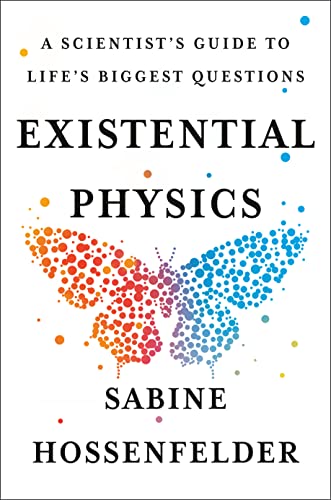Paulo Coelho
I delete tweets / Apago tweets ||| MINIONS:resposta oculta +block
Book Recommendations:
Recommended by Paulo Coelho
“A must read ( and you also should read her book released this August) https://t.co/OM8eEw5gPo” (from X)
by Sabine Hossenfelder·You?
by Sabine Hossenfelder·You?
A NEW YORK TIMES BESTSELLER “An informed and entertaining guide to what science can and cannot tell us.” —The Wall Street Journal “Stimulating . . . encourage[s] readers to push past well-trod assumptions […] and have fun doing so.” —Science Magazine From renowned physicist and creator of the YouTube series “Science without the Gobbledygook,” a book that takes a no-nonsense approach to life’s biggest questions, and wrestles with what physics really says about the human condition Not only can we not currently explain the origin of the universe, it is questionable we will ever be able to explain it. The notion that there are universes within particles, or that particles are conscious, is ascientific, as is the hypothesis that our universe is a computer simulation. On the other hand, the idea that the universe itself is conscious is difficult to rule out entirely. According to Sabine Hossenfelder, it is not a coincidence that quantum entanglement and vacuum energy have become the go-to explanations of alternative healers, or that people believe their deceased grandmother is still alive because of quantum mechanics. Science and religion have the same roots, and they still tackle some of the same questions: Where do we come from? Where do we go to? How much can we know? The area of science that is closest to answering these questions is physics. Over the last century, physicists have learned a lot about which spiritual ideas are still compatible with the laws of nature. Not always, though, have they stayed on the scientific side of the debate. In this lively, thought-provoking book, Hossenfelder takes on the biggest questions in physics: Does the past still exist? Do particles think? Was the universe made for us? Has physics ruled out free will? Will we ever have a theory of everything? She lays out how far physicists are on the way to answering these questions, where the current limits are, and what questions might well remain unanswerable forever. Her book offers a no-nonsense yet entertaining take on some of the toughest riddles in existence, and will give the reader a solid grasp on what we know—and what we don’t know.
Recommended by Paulo Coelho
“@sauravnutan @MBLivre yes, I did. Great, great book by @buddhisagar” (from X)
by Buddhisagar, Michael Hutt·You?
by Buddhisagar, Michael Hutt·You?
Karnali Blues, by Buddhisagar, is the most widely read Nepali novel to have appeared in the last twenty years. As it recounts the evolution of a father-son relationship-a son's search for approval, a father's small acts of kindness and forgiveness, a son's fears for his father's dignity as his fortunes and faculties begin to fail-the reader is deeply drawn into young Brisha Bahadur's world. His father is kind and idealistic; his mother, though she is kind too, is often frustrated and irascible. The characters in this book are some of the most carefully drawn and authentic in all of Nepali literature. In a backwater district of a country about to undergo radical social, political and cultural change, Brisha's dreams, his games and his mischief, his loves, his hopes and his fears come alive. Translated from the Nepali by Michael Hutt, this highly original piece of work, with the simplicity of its language and its emotional range, holds the power to take your breath away. Its principal themes-the love between a son and his father, the joys and sorrows of childhood, the daily struggle for survival-are universal, and will resonate with readers the world over.
Recommended by Paulo Coelho
“A must read: book by @Vinncent on 3rd World countries. I don’t like the title, but it had a huge impact on me.” (from X)
by Vincent Bevins·You?
NAMED ONE OF THE BEST BOOKS OF THE YEAR BY NPR, THE FINANCIAL TIMES, AND GQ “A radical new history of the United States abroad” (Wall Street Journal) which uncovers U.S. complicity in the mass-killings of left-wing activists in Indonesia, Latin America and around the world In 1965, the U.S. government helped the Indonesian military kill approximately one million innocent civilians. This was one of the most important turning points of the twentieth century, eliminating the largest communist party outside China and the Soviet Union and inspiring copycat terror programs in faraway countries like Brazil and Chile. But these events remain widely overlooked, precisely because the CIA's secret interventions were so successful. In this bold and comprehensive new history, Vincent Bevins builds on his incisive reporting for the Washington Post, using recently declassified documents, archival research and eye-witness testimony collected across twelve countries to reveal a shocking legacy that spans the globe. For decades, it's been believed that parts of the developing world passed peacefully into the U.S.-led capitalist system. The Jakarta Method demonstrates that the brutal extermination of unarmed leftists was a fundamental part of Washington's final triumph in the Cold War.


